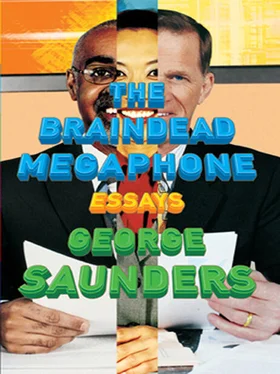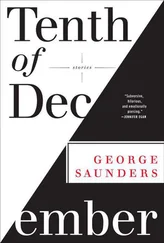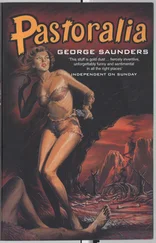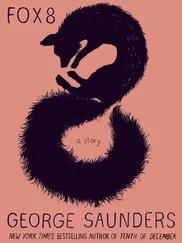All of what is debated and sometimes deplored about Huck Finn —its structural problems, its weak ending, its racism — can, I contend, be traced back to the fact that Twain only dimly and imperfectly understood that his book had a Central Moral Vector. Or rather, he knew, but sometimes forgot. Or rather, he knew, but periodically got interested in other aspects of the book and lost sight of it. Or maybe, and most interestingly: his Central Moral Vector was too hot to handle, and would have required him to simultaneously invent, understand, and complete his book in an entirely new genre, a genre that neither Twain nor the world was quite ready for.
THE ENDING, OH MY GOD, THE ENDING
Twain’s failure to love, honor, and obey his Central Moral Vector is most gut-droppingly apparent in the ending. “In the whole reach of the English novel, there is not a more abrupt or chilling descent,” wrote Bernard DeVoto, one of our great Twain scholars, and since we are heaping scorn on the ending, I may as well quote Leo Marx, another one of our great Twain scholars, who said that the ending “jeopardizes the significance of the entire novel.” Even Hemingway, who loved the book, and whose famous quote about it (“All modern American literature comes from one book by Mark Twain called Huckleberry Finn. It’s the best book we’ve had…. There was nothing before…”) is required for any introduction (and so I have now discharged that duty, with apologies to Melville and Poe and Hawthorne, who might feel that their books had at least a little something to do with modern American literature) — even Hemingway suggested that the reader stop reading before the end of the book, which, since Hemingway is no longer with us and therefore cannot beat me up, I have to say strikes me as a bit of a cop-out: the book has an ending, and Twain loved that ending, and wrote it in what was basically a transport of ecstasy in the summer of 1876, sometimes working from breakfast to dinner, and never disclaimed it afterward but proudly and successfully read from it on the book’s reading tour.
Having said all this, I will also say that there is a kind of perverse greatness in the ending, in the sense that Waterloo was a great last battle for someone as considerable as Napoleon. Some part of Twain realized what he had brought himself to the brink of, and great talent that he was, he did not tarry on the brink of that cliff, or pretend there was no cliff, or that he was not standing at the edge of it: instead he ran at high speed back the way he’d come, causing a disaster, but one that is on as grand a scale as the novel itself.
SO WHAT’S WRONG WITH IT, EXACTLY?
For me, the most moving part of the book is the scene at the end of chapter 23. Jim tells Huck about the time he slapped his young daughter in the head for not obeying him, only to find that she had never actually heard him: she had gone deaf from a recent bout with scarlet fever. It’s a heartbreaker, as I was reminded just now when I went to get the chapter reference, reread it, and started bawling. Any parent reading this is sickened with the magnitude and hurtfulness of Jim’s error, with the impossibility of ever really erasing it, and — this is a particular manifestation of Twain’s moral genius — with the fact that, horrible as this mistake would have been for any parent, this parent is a slave, a thousand miles from a home he will probably never get back to, if the prevailing national culture has its way.
We leave this scene with our sense of the Central Moral Vector confirmed: Huck’s dawning realization of Jim’s humanity is essential to the story, and Twain knows it.
Eighty pages or so later, Huck finds out that Jim has been sold and is being imprisoned, and has to decide what to do. There follows one of the most famous and wonderful passages in any literature, in which Huck decides, finally, to purposely do what he knows to be wrong — free Jim — and thus doom himself to hell. It is a brilliant hymn to clear-sightedness and against hypocrisy, and when you read it with the memory of the above-mentioned scene still fresh in your mind, the effect is to be slingshotted toward what now feels like the inevitable ending: Huck, who has lied and tricked his way down the river, will now lie and trick Jim free, or will try to.
Twain has written himself into a tough and very serious spot. Jim is being held prisoner in the Deep South by people used to holding prisoners, people who do not have wishy-washy opinions about slaves, or what to do with them, or what to do with people, even little boys, who help them escape. Three ideas, which Twain has skillfully nurtured throughout the book, come together: (1) Huck has transcended himself; (2) Jim is the best and most genuine human being in the book; and (3) the violence that has been intensifying and coming closer to Jim and Huck throughout the novel is now nearly upon them. And suddenly we feel, as perhaps Twain did, that the book has written itself out of its rollicking comic tradition and into something else, something more tragic and frightening, that would indict America in a way America would not soon forget.
Because what should happen is something deeply sad. Jim cannot escape, not for long, and Huck cannot remain unpunished for having helped Jim escape: the country Twain has made is too cruel and sure of itself and methodical in its slavery for either of these things to happen. And Twain understood the book — as we do — to be a comic novel, and the prospect of Jim being sold down the river or lynched, and Huck being bullwhipped and/or sent to a reformatory, say, does not gibe with our expectations of a comic novel, where violence happens only to side players, and generally off-camera, and usually because they deserve it.
So what does Twain do? This literary purist, who had lambasted James Fenimore Cooper for his too-lengthy canoes and exaggeratedly hearing-gifted Indians, commits one of the worst Coincidences in the history of writing. Huck approaches the house where Jim is being held, planning to enact another swindle, and a woman comes out, mistakes him for another little boy (we flinch a bit at this; mistaken identity has been used maybe once too often in the book), and then — horror of horrors — we learn that this other little boy’s name is Tom, and we begin whispering to ourselves, No way, no way, Mark, Sam, don’t do it —but our worst fears are soon confirmed: this woman is Tom Sawyer’s aunt, and she — here, eleven hundred miles upriver — is expecting a visit from Tom himself any minute now.
Now, a coincidence is all right, life is full of them, but a reader’s willingness to ingest one is inversely related to how badly the writer needs one, and Twain needed one very badly at this point, to avoid stepping into the dangerous trap his subconscious had set for him.
So at the moment when Huck seems most complete, heroic, and alive, Tom Sawyer, that Europhile, that conceptualizer, that American Philistine, comes flying up the river to save Twain from his own book.
A WORD ABOUT TOM, THAT STINKER
Tom Sawyer is likable enough in The Adventures of Tom Sawyer , tolerable in the opening chapters of Huck Finn , where he serves mostly as a marker for how much more humane and sensible Huck is. In those early chapters, Huck grows increasingly skeptical of Tom’s imitative and book-toadying and derivative style of adventure, and seemingly leaves him behind forever in the famous line “It had all the marks of a Sunday School.” Then it’s out on the river for Huck, eleven hundred miles of adventure and tricks and self-reliance and encounters with grown men, from which he emerges triumphant, saved again and again by his own common sense and wit, while presumably Tom is back home, dipping pigtails in inkwells and whining about how Sid is teasing him too much and so forth.
Читать дальше












